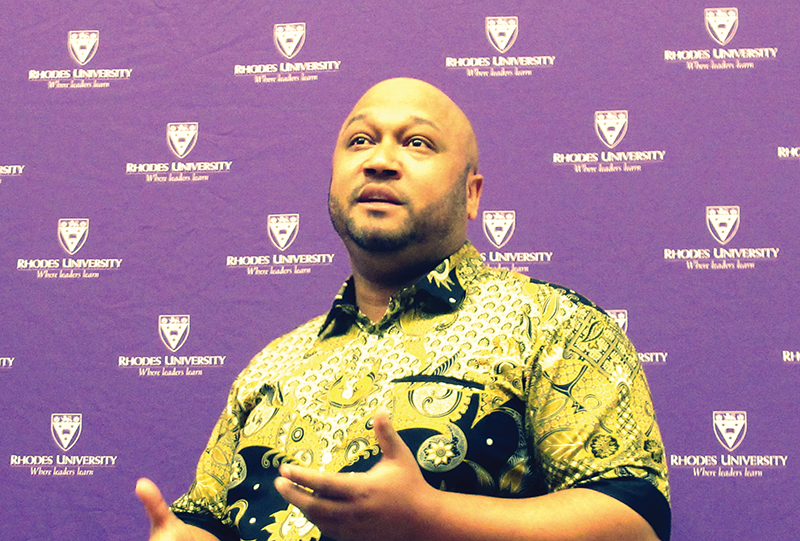
By KHUTHALA NANDIPHA
Grahamstown-born political analyst, Radio 702 host and international debating coach Eusebius McKaiser launched Rhodes University’s 2018 Transformation Inter-Res Debate competition on Friday, 4 May. The competition, organised by the Transformation Office, will see 53 residences compete for a trophy and a chance to attend an external Universities Debate competition under topics relating to transformation.
McKaiser, a Rhodes graduate, is a World Masters Debate and SA National Debate Champion. Speaking to debate competitors and enthusiasts, McKaiser credited debating for the successful life he currently enjoys in communication.
“Debating is an investment,” he enthused. “Research shows that debaters excel in their chosen areas of practice because they have learnt how to be assertive, how to reason and how to communicate analytically. This gives each individual a competitive edge in all they do; there is robust data behind this fact. Debating changed my life.”
As an extremely introverted teenager enrolled at Graeme College, McKaiser joined the Debate Club aged 13 to improve his English, as he is a first-language Afrikaans speaker. He warns of the early huddles relating to insecurity and lack of confidence in the use of the language to articulate a well-researched topic.
“It is unnerving to join debating when English is not your first language. The notion is that black and coloured children cannot be clever, not over white children. [But] it’s just a language barrier. As your confidence grows, so will your command of the chosen language and your assertiveness in topics.”
The topics of the competition will all be around transformation of the the purpose and culture at Rhodes University. However, topics will only be revealed days before a debate to ensure that the participating students do not regurgitate information that they have gleaned from Wikipedia.
According to Noluxolo Nhlapo, Director for the Equity and Institutional Culture Directorate, participating students are encouraged and expected to read broadly around issues of transformation in order to present cogent arguments that are supported by facts with only 24 hours preparation time.
McKaiser insists that to be a good debater, one has to read more than an average human being in order to do thorough research and speak factually when debating. Too often, he says, debaters think their opinion is good enough without substantive facts.
The launch showcased two debating teams discussing the ongoing low wage struggles of Rhodes University’s support staff. The teams presented two models as possible options to cheap labour.
“We are encouraging students and other community members to engage in discussions about transformation,” said Nhlapo. “This will, we expect, develop the skills of not only considering arguments that are contrary to ours before reaching conclusions on a matter but also skills of engaging with individuals who hold contrary views to ours.”
The debates will be hosted on school term Wednesdays outside SWOT Week and the examinations period. The next session will is 16 May and the finals in September.



